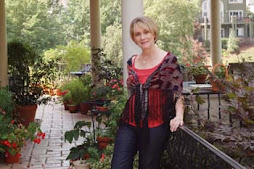
Today Patty chats with
novelist Leslie Lehr about “The Invisibility of Motherhood—the Hand that God sees.”
Leslie’s debut novel Wife Goes On certainly has some autobiographical threads. Leslie’s general market novel is receiving rave reviews.
PATTY: The reason that I decided to hold this, forum, for lack of a better word is because I have such a concern for moms who are coming on the scene now. There has never been such a glut of parenting books, but so many women still experience times of confusion about mothering. Monday I took on my own forum and shared the difference between rearing kids with character versus rearing them to perform. Today, I asked Leslie Lehr if she would air out some of the difficulties of being a single parent. Leslie, you're a single parent of how many children?
LESLIE: Two girls, 16 and 19. Which sounds like I'm almost done, but it sure doesn't feel that way. As they say: little kids, little problems, big kids, big problems.
PATTY: It’s true. Just recently there was a Hickman coup among the men in my family. My boys are both in college. And in just checking in with them, making sure they still feel my support, I stepped across a boundary that had been newly erected—grown men not wanting mom checking in on them. We moms are often fallible, often to our own worry and guilt that we're ruining our children. But we learn from own mothers, at times, what not to do. What have you tried to pass on to your girls that you feel is different from how your mother reared you?
LESLIE: I don't know that we can ever know that we are doing the best thing for each child. I worry all the time about making the right decisions. The failures haunt me because they can happen even when you are trying to do what's best.
PATTY: Right, I’ll think I finally have a master’s degree in mothering, but then it seems I’m back in training wheels again. You experienced this yourself as a mother of a college age daughter, didn’t you?
LESLIE: Yes, I stepped back and let my older daughter choose her college freshman year - after another family member influenced her greatly - after knowing that she had loved a school we had visited together. I didn't want to be the bossy mom responsible for her decision. After a horrible year at the first school, she is starting over at the school I would have recommended, and it's the perfect fit. So, while it was a great lesson for her to follow her heart, and that she can stumble and get up and be stronger than ever, I still wonder if I should have been more assertive.
PATTY: We’ve had the same “runs” at finding the right college with all three. I guess we have to let go and let them learn. In our culture, there is a tendency to be helicopter parents in our children’s early adult years.
LESLIE: It's just impossible to know when is time to let them try out those wings. And just recently, I learned that my other daughter has a health issue that was tested every year and came out fine on the usual tests. Since I have overcompensated for my own upbringing, I changed careers to work at home and be a hands on mom who runs to the doctor for every sneeze - and still can't win!
PATTY: This is resonating deeply with me.
LESLIE: It can be hard to figure out, even evaluating the most basic issues, how to play that balance between being the aggressive mom making doctors do extra tests even if they roll their eyes, or being the relaxed one.To answer the question more directly, I don't believe we can ruin our children, there are too many other factors at play.
PATTY: I can hear sighs all over cyberspace.
LESLIE: And we have to be very careful about what we learned from our mothers, because, often the jury is still out. I do believe, however, that being a good role model is the most important thing we can do as mothers. So I try to be a good person, a hard worker, and a loving mother, every day. Not necessarily in that order, lol.
Patty: Haha! Those hats get juggled. When you and I chat about our kids, the word "compensate" crops up. I think that when we’ve had to overcome flawed upbringings, there’s that tendency to try and reach outside those parameters. I’m sure my sons will do that too. How do you work this compensation into your parenting practices and do you feel that you are patient to wait out the results?
LESLIE: I am far more patient on Monday mornings than after a long week on Friday nights! And I think we compensate on every level, with time, money, and attention, for our children. I tend to compensate with groceries - somehow, providing yummy fresh food helps me feel like a good mom - and I don't feel as nervous spending money on food than on clothes or other things!
PATTY: Yes, my hubby was so helpless around the house that I reared our two sons to feel very at home in the kitchen. If their art careers don’t work out, they could be chefs, literally!
LESLIE: I think we compensate as parents the same way we do in our own lives, more of this and less of that on any particular day. A balance. It often feels like juggling - keeping those balls in the air. I try to be patient by reminding myself that, 'this too shall pass.' And by trying to remember the sweet moments instead of the scary ones.
PATTY: Yes, we can’t be so hard on ourselves that the energy needed for mothering is drained out through worrying. As a single mother, you've probably figured out that you can't be both a dad and a mom. (or perhaps you have found that magic button) Have you sought out father figures for your daughters or found a support system that helps them see men in a positive light?
LESLIE: I never wanted to be a single mother, fought way too long to avoid it. I feel horrible that I wasn't able to provide the kind of father I would have liked them to have, but....I have them 24/7, their dad even lives out of state now, and so I do struggle with being both the disciplinarian and the comfort zone.
PATTY: I’m sure it’ was like learning to operate again inventing your new role as you went. But you’ve done beautifully and I want to commend single moms joining us today for the double-duty you sometimes have to pull in this role.
LESLIE: Their dad traveled a lot, so they were used to just having me home anyway. Maybe that helped. In any case, I do like it when they have male teachers at school to respect. I have also been extremely slow and careful when it came to dating after my divorce. And was fortunate enough to find someone who respects my role as a mother and is truly kind-hearted, smart, reliable - and who treats me very well. Being treated badly - and having all of us think it was normal - was the deciding factor in my divorce, so I make sure they notice how my boyfriend is true to his word, and shows up on time and takes me to wonderful places. And that I still have my own life and identity-- and still see my girlfriends a lot. With teenagers, I am less concerned that they have a good father figure than I am that they have a good role model for the right kind of man to marry, a man who will be a good father for their own children someday.
PATTY: That’s such a good point, that life may not hand us what we imagined would be the “perfect” environment for rearing our children. Life is certain to surprise us. What’s your favorite tenet to pass along to your children?
LESLIE: I believe in the Golden Rule above all others: Do unto others as you would have them do unto you.
PATTY: Jesus reiterates this in Matthew 7:12, like a big exclamation point at the end of the Sermon on the Mount.
LESLIE: And we are here on earth to contribute to that, to make it a better place, and to spread love.
PATTY: Our mutual author friend Kaya McLaren and I will be chatting next week about that very topic—compassion and true expressions of love.
LESLIE: And, of course, I pray. For their happiness and health - and late at night when I am waiting up for my daughter to come home, safe and sound.
PATTY: Wife Goes On is Leslie’s novel. It has an underlying theme of motherhood in it, with the main character struggling to remain close to her teenage daughter, the beauty queen facing life as a young single mother, the lawyer fighting for her daughter back, and the actress whose life has been shaped by her miscarriage.
LESLIE: In fact, the reason I am fighting to fix the copy on the back that says the main character left a "hohum" marriage is because that's absurd. No mother would do that. Once you have children, divorce is very serious and that's why it was so amazing to me personally, that I could find such joy after the dark days. Which is why I wrote the book, to share the hope for happiness with others and their friends--who help!
PATTY: Leslie, I’m so glad we met a few weeks ago at the Girlfriend’s Weekend in Texas. You struck me right away as a woman who makes sacrifices for your girls. And I somehow suspected that any mom who lives out their motherhood in such a visible fashion would provide us with some wisdom. And you’ve certainly done that for us. Thank you, Leslie, for chatting today on Words to Go.
Please visit Leslie online at
www.wife-goes-on.com .Wife Goes On is a blend of serious general market fiction wrapped with a chick-lit bow. Leslie is giving away this book in the big give.
This week we continue our author chats asking authors to share with us the imperfections of rearing our kids, but the wonder that we find in the process.
Tomorrow I’m pleased to tell you that my awesome friend and prayer partner bestselling Christian novelist
Terri Blackstock and I will be chatting about the sometimes heavy burden of praying for our kids. Do come and please leave feedback, Mon-Fri. and your name is entered in the Big Straw Hat for book give-aways.


















